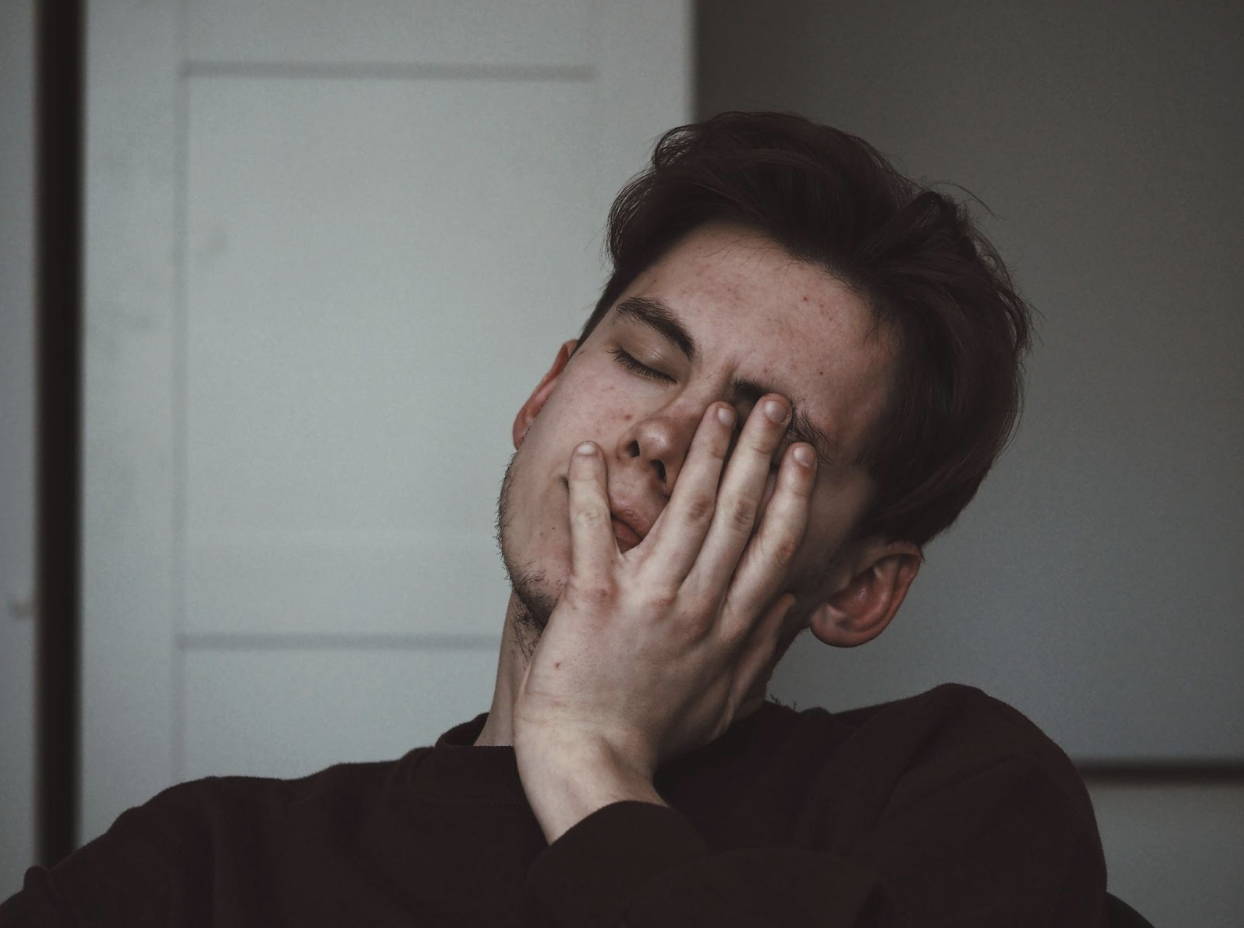Determining what causes headaches can require some detective work. This guide will help determine the type, triggers, and possible solutions.

September 2022. This article is independently written by Shelby Golding. All opinions given are hers. Shelby has been certified as a personal trainer and nutritional specialist since 2007. In 2008, she found her passion for writing about these topics and hasn't looked back.

Because some people experience them every day, headaches often go untreated. Conservative estimates guess that 50% of the world’s population has experienced at least one headache in the past year. However, it's hard to know the exact percentage of people who suffer from headaches since most headaches also go undiagnosed.
Similar to how your body produces a fever in response to harmful viruses, headaches are one of the body's signals that it's not well. And yet, most people write off headache pain, pop ibuprofen, and go on with their day.
What Causes Headaches
Determining the cause of a headache could be one of the reasons most people don't bother to see a doctor when one rears its ugly head. Causes vary from mild to severe, and even minor imbalances in the body's systems might result in headaches.
Technically, headaches result from an unknown mechanism that activates nerves in the brain and affects the surrounding muscles and blood vessels. The nerves then send pain signals to the brain, causing a headache.
However, understanding what causes headaches in terms of physical reactions within the brain does not explain what triggered the response in the first place.
While some headache causes remain a mystery without the help of a doctor, some common triggers include:
Technically, headaches result from an unknown mechanism that activates nerves in the brain and affects the surrounding muscles and blood vessels. The nerves then send pain signals to the brain, causing a headache.
However, understanding what causes headaches in terms of physical reactions within the brain does not explain what triggered the response in the first place.
While some headache causes remain a mystery without the help of a doctor, some common triggers include:
- Alcohol use
- Depression
- Stress
- Excessive medication use
- Tension in the head, neck, and shoulders
- Lighting
- Loud noise
- Changes in weather
- Caffeine withdrawal
- Lack of sleep
- Food allergies
Each of these triggers causes a different type of headache, ranging from bothersome but easy-to-avoid hangovers to persistent and difficult-to-treat migraines.
Four Common Headache Types
Identifying the type of headache you're experiencing is like following a trail of breadcrumbs back home. Once you know what kind of headache you are experiencing, you can also identify the cause. Then you can proceed to treat your headache accordingly.
The most common types include tension headaches, migraines, sinus headaches, and cluster headaches.
The most common types include tension headaches, migraines, sinus headaches, and cluster headaches.
1. Tension
Tension headaches are easily the most common. Usually, mild to moderate and caused by stress, muscle tension, or a combination of the two. These headaches often come with a steady ache on both sides of the head.
2. Migraine
Migraines vary in intensity from moderate to severe. The second most common type of headache may cause nausea, sensitivity to light and sound, and pounding or throbbing pain. Unfortunately, migraines are infamously challenging to treat and can last from four hours to several days.
Menstrual migraines are unique to women, resulting from fluctuating hormones during the menstrual cycle. They usually occur a few days before a woman's period and persist for up to three days during her period.
Menstrual migraines are unique to women, resulting from fluctuating hormones during the menstrual cycle. They usually occur a few days before a woman's period and persist for up to three days during her period.
3. Sinus
Sinus headaches result from a sinus infection. The sinuses become inflamed and congested, which might cause a bad taste in your mouth, pain in your cheekbones and forehead, swelling, and/or tinnitus. Sinus headaches often accompany cold symptoms such as a running nose, sore throat, or fever.
4. Cluster
Cluster headaches get described as a burning or stabbing sensation. The most severe headache comes in "clusters," occurring one to eight times a day for several months. Usually, they appear during seasonal transitions, in the spring or fall, and the pain radiates from behind one of your eyes.
Tension headaches, migraines, sinus headaches, and cluster headaches are the most common types of headaches but are not the only ones. The medical community recognizes over 150 different types of headaches.
Tension headaches, migraines, sinus headaches, and cluster headaches are the most common types of headaches but are not the only ones. The medical community recognizes over 150 different types of headaches.
Headache Prevention
If you are dealing with consistent headaches, whatever the type, you need to identify your triggers. The list above will provide some guidance, but everyone's triggers are unique. For example, people with gluten sensitivity are more likely to experience migraines after they've eaten glutinous bread, pasta, etc.
You might need to address several aspects of your lifestyle to get rid of the headaches.
A few habits you might want to examine include:
You might need to address several aspects of your lifestyle to get rid of the headaches.
A few habits you might want to examine include:
- Sleep length and quality
- Diet — food allergies, skipping meals, poor food quality, excess sugar, etc.
- Exercise
- Stress levels
- Caffeine and alcohol consumption
- Medications or supplements
If determining the cause feels intimidating, try keeping a headache diary. Whenever you experience a headache, write down all the factors that could have contributed. Over time, you might see some patterns emerge.
Perhaps the headaches only happen once a month around your period or every time you order pizza from the place down the street. Channel your inner detective, and, as always, you can refer to your primary care doctor for assistance.
Perhaps the headaches only happen once a month around your period or every time you order pizza from the place down the street. Channel your inner detective, and, as always, you can refer to your primary care doctor for assistance.
Natural Headache Solutions

These natural headache solutions are most effective when used regularly and include:
- Drinking plenty of water
- Using essential oils
- Taking a B-complex vitamin
- Trying acupuncture or yoga
- Drinking ginger tea
Finding your unique triggers and the best solutions for you may take some time. So be patient with your body as you experiment.
Remember that headaches are not always the problem but might be a signal from your body that something else is out of balance. Work hard to correct those imbalances, whether in your overall health or lifestyle, and you'll also rid yourself of persistent headaches.
When to See a Doctor
While you may want to figure out what causes headaches on your own, a certified medical professional might be necessary to trace the cause to its source. For example, sudden, new, or severe headaches could indicate a neurological disorder, especially when accompanied by weakness, loss of balance, numbness, and mental confusion.
The same is true if you get more than three headaches per week, have persistent headaches that won't go away, or consistently take pain relievers. Again, follow your instincts and seek medical care sooner rather than later if your symptoms are alarming or constant.
Remember, your Kailo Pain Patch can help support you on your journey to health, allowing you to take a deep breath as pain fades away. Kailo is to work by interfering with your body’s electrical system, and a recent clinical study showed that 97% of users were extremely satisfied with Kailo over oral medication.
Disclaimer: Kailo should not be used if you have a pacemaker or if you are pregnant. Always consult your doctor or health care professional before using Kailo.
The same is true if you get more than three headaches per week, have persistent headaches that won't go away, or consistently take pain relievers. Again, follow your instincts and seek medical care sooner rather than later if your symptoms are alarming or constant.
Remember, your Kailo Pain Patch can help support you on your journey to health, allowing you to take a deep breath as pain fades away. Kailo is to work by interfering with your body’s electrical system, and a recent clinical study showed that 97% of users were extremely satisfied with Kailo over oral medication.
Disclaimer: Kailo should not be used if you have a pacemaker or if you are pregnant. Always consult your doctor or health care professional before using Kailo.






